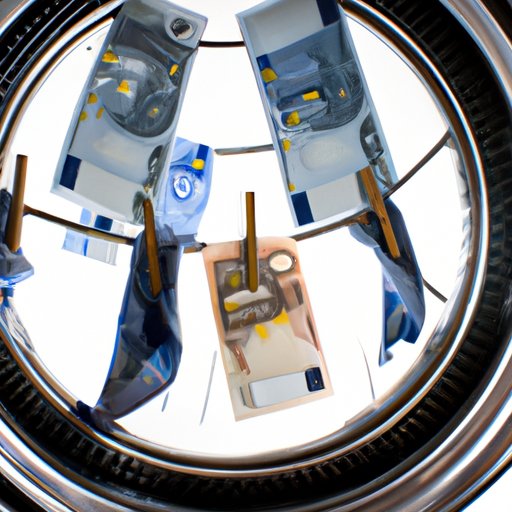Introduction
Money laundering is a serious global issue. It refers to the illegal process of disguising the proceeds of crime to make them appear legitimate. With criminals using more complex techniques to launder money, the act is becoming more difficult to control. In this article, we’ll explore the process of money laundering, its negative effects on individuals and society, and preventive measures individuals and businesses can take to protect themselves.
A Step-by-Step Guide to Understanding Money Laundering
Money laundering often involves three steps: placement, layering, and integration. Placement is the initial stage of moving the illegal money into the financial system by depositing it into banks or other financial institutions. The next stage, layering, involves separating the money from its criminal source by conducting various and complex transactions to make the money impossible to trace. The final stage, integration, is when the money is reintroduced into the legitimate financial system to make it seem like profits from legitimate business activities.
For example, suppose a drug dealer in Colombia earns revenue in cash but can’t deposit the cash to any bank directly. He will need to find a way to deposit that cash in banks without exposing himself. To do so, the dealer will place his illegal cash into accounts held by many individuals, keeping the deposits smaller than $10,000 to avoid raising red flags. In the layering stage comes an in-between step where the deposited cash will move to multiple banks and then countries to conceal the source of the deposit. In the last stage of integration, the drug dealer will then wire the money to his business in the United States, making it seem like profits from his legitimate export business.
The Consequences of Money Laundering for Individuals and Society
Money laundering is a significant threat to individuals and society. It can harm economic stability, increase crime rates, and erode trust in financial institutions. In the case of economic stability, large amounts of money laundering can distort an economy, making it difficult for legitimate business to compete in the marketplace.
As for crime rates, money laundering helps create a haven for underground economies, and crime rates tend to increase alongside money laundering. It also facilitates corruption and allows those with access to dirty money to influence politicians, anti-corruption groups, or law enforcement agencies.
Lastly, trust in financial institutions is paramount in today’s world, where digital transactions have considerably grown. Money laundering activities that go unnoticed can significantly affect the trust of depositors and markets, breaking the foundation of the financial system.
The History of Money Laundering
Money laundering is a relatively new crime, dating back to the early 20th century. It originated from Italian gangs in the US, who laundered their profits from bootlegging alcohol. They purchased launderettes and used them for criminal purposes. The cash received would mix with clean cash, and then the so-called ‘clean’ cash was returned to the gang.
Money laundering evolved significantly, thanks to the arrival of the modern financial system and advancements in technology. Financial instruments such as wire transfers make it difficult to monitor money, and the increased globalization of financial markets makes it easy to transfer money worldwide, making it difficult to track transactions.
To fight this issue, many international and national laws have been passed to combat money laundering, such as the USA Patriot Act and the European Union’s third money laundering directive. Law enforcement agencies worldwide work together to investigate the matter, and even the banks themselves have established internal compliance measures to detect and report suspicious activities.
The Role of Technology in Money Laundering
Technology has revolutionized the way business is done, including that of money laundering. Cryptocurrency platforms, for instance, are becoming a popular tool for money laundering, thanks to their ease of use and anonymity in transactions. An individual who wants to launder money can invest in cryptocurrency with illegal cash, making it difficult to trace the source of the funds.
Similarly, the dark web, an encrypted part of the internet known for illegal activities, has become a hub for money laundering. On the dark web, illegal items such as drugs, arms, and child pornography can be bought using cryptocurrency.
While technology is increasingly becoming sophisticated, it can be used to fight money laundering as well. The ease with which information can now be accessed can significantly help in detecting suspicious transactions. Governments and financial institutions worldwide enhance their capabilities in monitoring high-risk transactions with the help of artificial intelligence.
How to Prevent Money Laundering as an Individual or Business
To prevent yourself or your business from becoming involved in money laundering, you must stay informed. Engage in training and education on anti-money laundering policies and procedures. Conduct proper due diligence and know your customers to avoid serving as an avenue for money laundering.
It is also recommended that your business has strong privacy policies to protect against data breaches and cyber attacks that could expose you to money laundering risks. Ensure that your company meets local anti-money laundering legislation to avoid legal problems and negative financial impacts.
Conclusion
Money laundering is a significant issue that impacts individuals and society. In today’s world, it is vital to stay informed about the impact of money laundering, how it works, and how to prevent it. By enhancing our knowledge on this subject and actively taking preventive measures, we can help fight money laundering and protect ourselves from its negative consequences.
